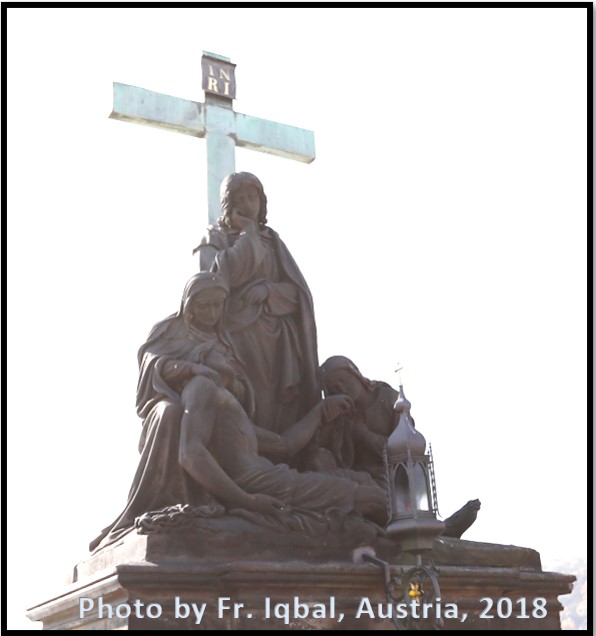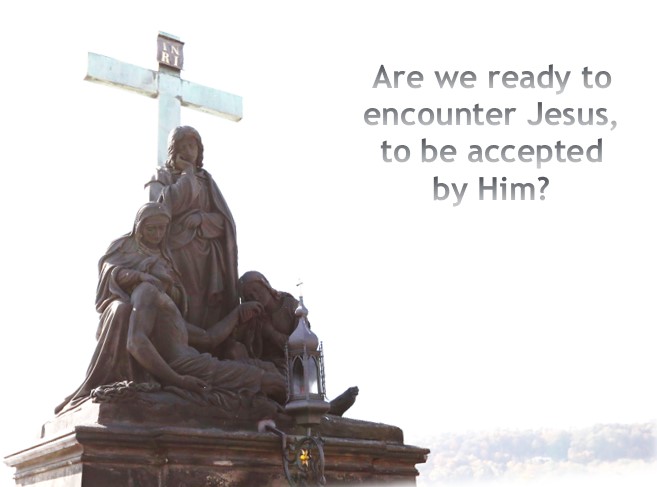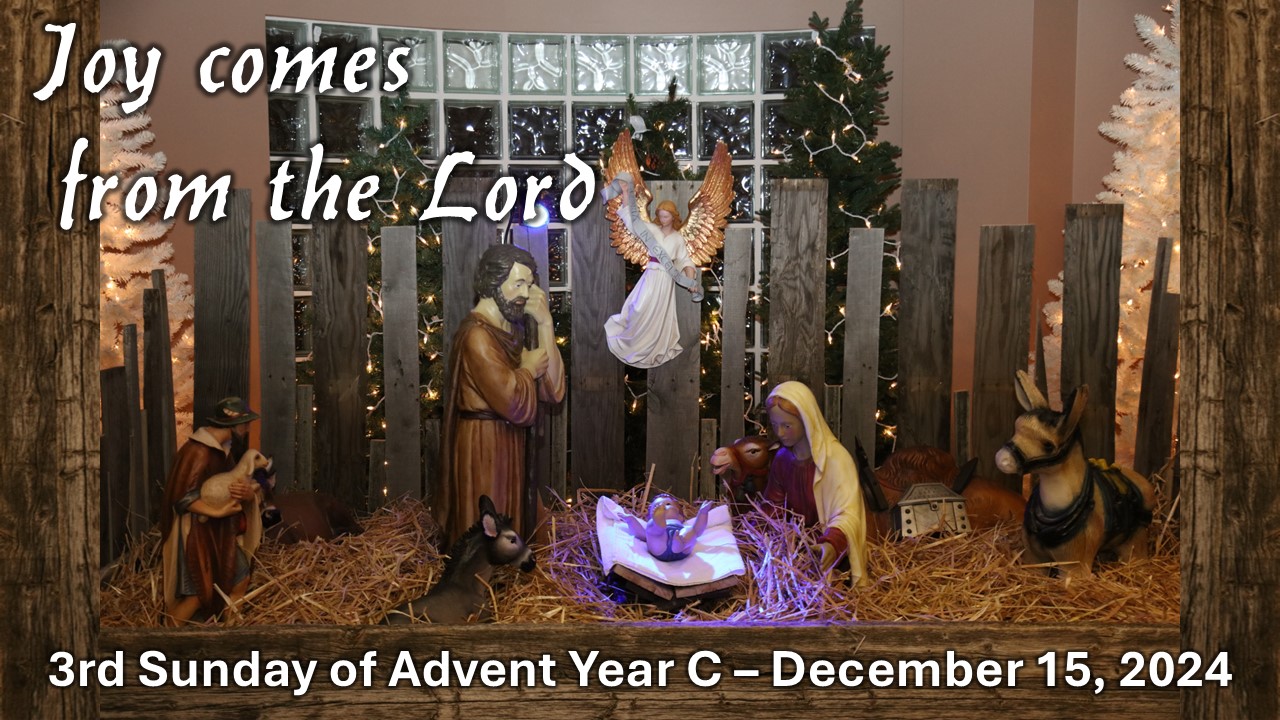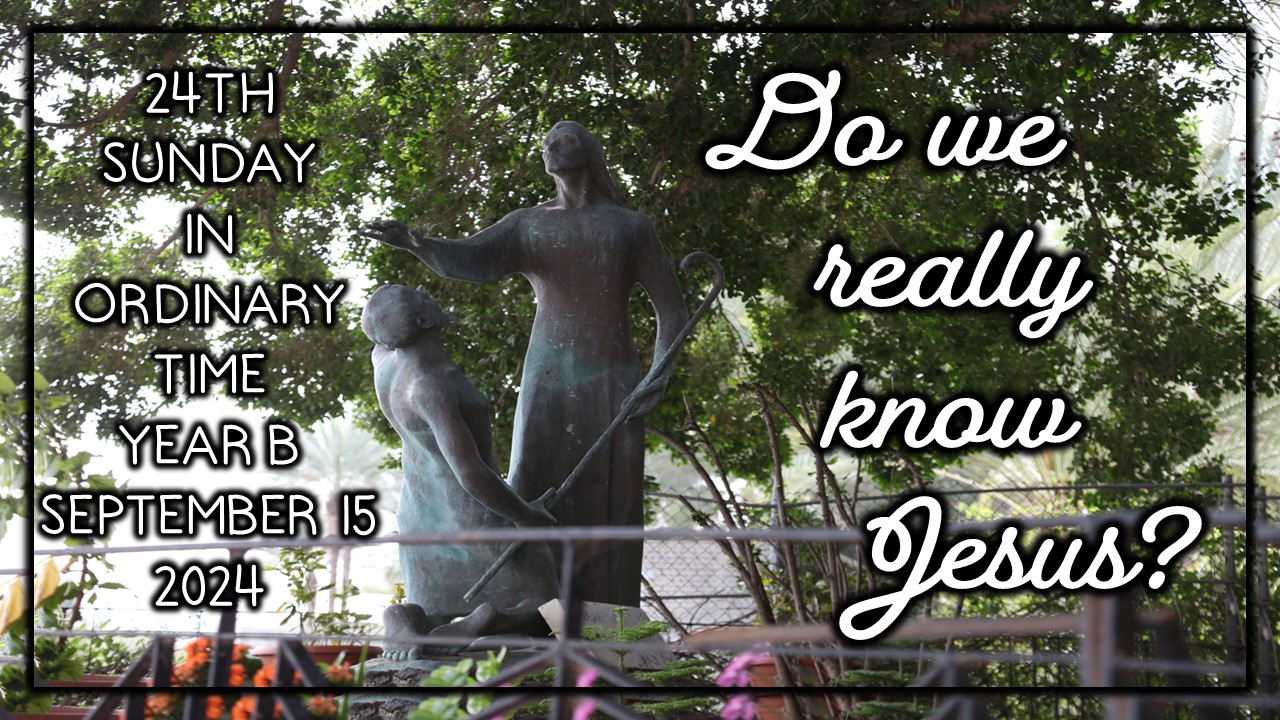
20th Sunday in Ordinary Time Year C ~ August 14, 2022
OUR FAITH & SUFFERING
Saint Theodoret of Cyr, bishop (AD 393-458 modern day Syria) reflects on the mystery of our faith and suffering as follows: “Our Savior’s passion is a healing remedy for us, as the prophet teaches when he cries out: He bears our sins and suffers pain for us, and we esteemed him stricken, smitten by God and afflicted. But for our sins he was wounded, for our iniquities he was bruised; upon him fell the chastisement that brought us peace, and by his wounds we are healed. We had all gone astray like sheep, and therefore he was led like a lamb to the slaughter and was dumb like a sheep before its shearer.
When a shepherd sees that his sheep have scattered, he keeps one of them under his control and leads it to the pastures he chooses, and thus he draws the other sheep back to him by means of this one. And so, it was when God the Word saw that the human race had gone astray: he took the form of a slave and united it to himself, and by means of it won over the whole race of men to him, enticing the sheep that were grazing in bad pastures and exposed to wolves, and leading them to the pastures of God.
This was the purpose for which our Savior assumed our nature, this was why Christ the Lord accepted the sufferings that brought us salvation, was sent to his death, and was committed to the tomb. He broke the grip of the age-old tyranny and promised incorruptibility to those who were prisoners of corruption. For when he rebuilt that temple which had been destroyed and raised it up again, he thereby gave trustworthy and firm promises to those who had died and were awaiting his resurrection.
Jesus tells us: “Just as my human nature, which I took from you, has won its resurrection in virtue of the Godhead that dwelt in it and with which it was united, just as this nature has shed decay and suffering and passed over to incorruptibility and immortality; so, in the same way, you too will be set free from the grievous slavery of death; you too will cast aside your corruptible nature and your sufferings and you will be clothed with impassibility.” To this end he imparted the gift of baptism to all mankind through his apostles. Go, he said, make disciples of all nations, baptizing them in the name of the Father and of the Son and of the Holy Spirit. Baptism is a kind of symbol and type of the Lord’s death, which is why Paul says: If we have shared with God’s Son in a death like his, we shall certainly share in his resurrection”.
If we read the Servant Hymns of Prophet Isaiah (Chapters 50-53), we can understand the mystery of our faith and suffering because “he bore our infirmities and iniquities onto him and was led like to lamb to be slaughtered”. St. Peter rightly says, “cast all our worries onto him who cares about us”. In the Letter to Hebrews (chapter 9) we read all about the sacrifice of our Saviour who suffered and died for us so that we may have life and life in abundance. The following story should help us to understand the sacrifice of Jesus and strengthen us to have strong faith and never to be afraid about suffering.
Once there used to be a king, who was considered eccentric by all because he used to give death penalty to anyone even for the smallest mistakes. In the palace of the king, 20 vases were decorated very beautifully, and King loved to show this collection to his guests. One day while cleaning, a vase fell and broke by servant. When king got to know about it, he ordered servant to be hanged. An old man who was passing by that kingdom, heard about king’s nature. He came to know about this incident and about King’s vase collection. He decided to visit King’s palace. On meeting King, he told him, “I have a way to bring that vase back to it’s original state”.
King became happy and asked servants to take that old man to place where all other vases were kept. As soon as old man entered, he started hitting all other vase with his stick and broke them all. King was informed immediately. On seeing this, King became very angry with this and said, “why you did this? Why? You will be hanged for this”. King ordered his servant to arrest that old man.
To this old man replied sternly, “when a vase was broken by a servant, you gave him death sentence, that means every single time a vase broke, a person must face the death penalty. In future 19 more people were likely to die because of these vases. So, today, as a human being I did my duty, by saving 19 lives. Now you can hang me. I feel no regret for doing this”. Old man’s word opened the eyes of the King and he realized his mistakes and freed the servant from his punishment.
The same as our Saviour sacrificed himself and made us to have courage and boldness to put an end to evil.
In the First Reading we could see the suffering of Prophet Jeremiah who was called to be a prophet and a messenger from his mother’s womb. He suffered a lot but never gave up his trust and faith in God. He suffered to the point where he wished to have death over life; “O Lord, you know; remember me and visit me, and bring down retribution for me on my persecutors. In your forbearance do not take me away; know that on your account I suffer insult. Your words were found, and I ate them, and your words became to me a joy and the delight of my heart; for I am called by your name, O Lord, God of hosts”. He suffered because he spoke the truth and let the House of Israel know of their evil ways which were according to the commandments and precepts of the Lord. However, people didn’t like his words of preaching and finally they are tried to kill him, but the Lord was at his side and he saved him; “And I will make you to this people a fortified wall of bronze; they will fight against you, but they shall not prevail over you, for I am with you to save you and deliver you, says the Lord. I will deliver you out of the hand of the wicked and redeem you from the grasp of the ruthless”.
We can also relate our own sufferings with Prophet Jeremiah. Our sufferings sometimes bring us closer to the Lord but sometimes take us away from him because we want an easy and problem free life. Remember the story of the ten lepers and their sufferings but once they were cured, they all went away except one to thank the Lord for his healing. Our faith becomes strong in our sufferings which lead us to believe that “He is our Good Shepherd and there is nothing we shall want”.
St. Augustine wrote an amazing reflection on the martyrdom of St. Lawrence and just reminded us to learn from him how he poured his blood for the sake of Christ. “The Roman Church commends to us today the anniversary of the triumph of Saint Lawrence. For on this day, he trod the furious pagan world underfoot and flung aside its allurements, and so gained victory over Satan’s attack on his faith.
As you have often heard, Lawrence was a deacon of the Church at Rome. There he ministered the sacred blood of Christ; there for the sake of Christ’s name he poured out his own blood. Saint John the apostle was evidently teaching us about the mystery of the Lord’s supper when he wrote: Just as Christ laid down his life for us, so we ought to lay down our lives for the brethren. My brethren, Lawrence understood this and, understanding, he acted on it. Just as he had partaken of a gift of self at the table of the Lord, so he prepared to offer such a gift. In his life he loved Christ; in his death he followed in his footsteps.
Brethren, we too must imitate Christ if we truly love him. We shall not be able to render better return on that love than by modeling our lives on his. Christ suffered for us, leaving us an example, that we should follow in his steps. In saying this, the apostle Peter seems to have understood that Christ suffered only for those who follow in his steps, in the sense that Christ’s passion is of no avail to those who do not. The holy martyrs followed Christ even to shedding their life’s blood, even to reproducing the very likeness of his passion. They followed him, but not they alone. It is not true that the bridge was broken after the martyrs crossed; nor is it true that after they had drunk from it, the fountain of eternal life dried up. I tell you again and again, my brethren, that in the Lord’s Garden are to be found not only the roses of his martyrs. In it there are also the lilies of the virgins, the ivy of wedded couples, and the violets of widows. On no account may any class of people despair, thinking that God has not called them. Christ suffered for all. What the Scriptures say of him is true: He desires all men to be saved and to come to knowledge of the truth.
Let us understand, then, how a Christian must follow Christ even though he does not shed his blood for him, and his faith is not called upon to undergo the great test of the martyr’s sufferings. The apostle Paul says of Christ our Lord: Though he was in the form of God he did not consider equality with God a prize to be clung to. How unrivaled his majesty! But he emptied himself, taking on the form of a slave, made in the likeness of men, and presenting himself in human form. How deep his humility! Christ humbled himself. Christian, that is what you must make your own. Christ became obedient. How is it that you are proud? When this humbling experience was completed and death itself lay conquered, Christ ascended into heaven. Let us follow him there, for we hear Paul saying: If you have been raised with Christ, you must lift your thoughts on high, where Christ now sits at the right hand of God.
I would like to share some quotes on suffering by saints before I reflect on the Gospel to help us to learn how to deal with our suffering and have strong faith.
“Pain and suffering have come into your life, but remember pain, sorrow, suffering are but the kiss of Jesus — a sign that you have come so close to Him that He can kiss you.” St. Teresa of Calcutta
“And the Lord said to me, “My child, you please Me most by suffering. In your physical as well as your mental sufferings, My daughter, do not seek sympathy from creatures. I want the fragrance of your suffering to be pure and unadulterated. I want you to detach yourself, not only from creatures, but also from yourself…The more you will come to love suffering, My daughter, the purer your love for Me will be”. Diary of Saint Maria Faustina Kowalska
“When I shrink from suffering, Jesus reproves me and tells me that He did not refuse to suffer. Then I say ‘Jesus, Your will and not mine’. At last, I am convinced that only God can make me happy, and in Him I have placed all my hope”. St. Gemma Galgani
“A cross carried simply, and without those returns of self-love which exaggerate troubles, is no longer a cross. Peaceable suffering is no longer suffering. We complain of suffering! We should have much more reason to complain of not suffering, since nothing makes us more like Our Lord than carrying His Cross. Oh, what a beautiful union of the soul with Our Lord Jesus Christ by the love and the virtue of His Cross!” St. John Vianney
“Trials and tribulations offer us a chance to make reparation for our past faults and sins. On such occasions the Lord comes to us like a physician to heal the wounds left by our sins. Tribulation is the divine medicine.” St. Augustine of Hippo
“One must not think that a person who is suffering is not praying. He is offering up his sufferings to God, and many a time he is praying much, more truly than one who goes away by himself and meditates his head off, and, if he has squeezed out a few tears, thinks that is prayer.” St. Teresa of Avila
“I do not know what will happen to me; I only know one thing for certain, that the Lord will never fall short of His promises. “Do not fear, I will make you suffer, but I will also give you the strength to suffer,” Jesus tells me continually. “I want your soul to be purified and tried by a daily hidden martyrdom”. How many times,” Jesus said to me a little while ago, “would you have abandoned me, my son, if I had not crucified you.” St. Pio of Pietrelcina
“I want to suffer and even rejoice for love, for this is my way of scattering flowers. Never a flower shall I find but its petals shall be scattered for you; and all the while I will sing; yes, always sing, even when gathering roses in the midst of thorns; and the longer and sharper the thorns may be, the sweeter shall be my song!” St. Therese of Lisieux.
The Gospel for this Sunday is part of Jesus’ teachings to the disciples during his journey to Jerusalem, where death on the cross awaits him. To explain the purpose of his mission, he takes three images: fire, baptism, and division. The words of Jesus in the Gospel today are warning for us, but we must be very careful otherwise we may have misunderstanding. Jesus says to his disciples: “Do you think that I have come to give peace on earth? No, I tell you, but rather division”. What does this mean? It means that faith is not a decorative or ornamental element; living faith does not mean decorating life with a little religion, as if it were a cake and we were decorating it with cream. No, this is not faith. Faith means choosing God as the criterion and basis of life, and God is not empty, God is not neutral, God is always positive, God is love, and love is positive! After Jesus has come into the world it is impossible to act as if we do not know God, or as if he were something that is abstract, empty, a purely nominal reference. No, God has a real face, he has a name: God is mercy, God is faithfulness, he is life which is given to us all. For this reason, Jesus says “I came to bring division”. It is not that Jesus wishes to split people up. On the contrary Jesus is our peace, he is our reconciliation! But this peace is not the peace of the tomb, it is not neutrality, Jesus does not bring neutrality, this peace is not a compromise at all costs. Following Jesus entails giving up evil and selfishness and choosing good, truth and justice, even when it demands sacrifice and the renunciation of our own interests. And this indeed divides; as we know, it even cuts the closest ties. However, be careful: it is not Jesus who creates division! He establishes the criterion: whether to live for ourselves or to live for God and for others; to be served or to serve; to obey one’s own ego or to obey God. It is in this sense that Jesus is a “sign that is spoken against”.
We are living in a time and world where people are getting offended for everything and by everyone and to keep our faith needs more strength and determination. One way to have strong faith is the fire of the Holy Spirit as our Lord expresses it with these words: “I came to cast fire upon the earth; and would that it were already kindled!”. The fire that Jesus speaks of is the fire of the Holy Spirit, the presence living and working in us from the day of our Baptism. Jesus wants the Holy Spirit to blaze like fire in our heart, for it is only from the heart that the fire of divine love can spread and advance the Kingdom of God. It does not come from the head; it comes from the heart. Therefore, Jesus wants fire to enter our heart. If we open ourselves completely to the action of this fire which is the Holy Spirit, He will give us the boldness and the fervour to proclaim to everyone Jesus and his consoling message of mercy and salvation, navigating on the open sea, without fear. (Please read the story of two disciples on their way to Emmaus Luke 24).
If the Church does not receive this fire, or does not let it inflame her, she becomes a cold or merely lukewarm Church, incapable of giving life, because she is made up of cold and lukewarm Christians. It will do us good today to take five minutes to ask ourselves: “How is my heart? Is it cold? Is it lukewarm? Is it capable of receiving this fire?”. Let us take five minutes for this. It will do everyone good. (Please read Revelation 3:1-20).
Let me conclude my reflection with a story to remind us to be strong in our faith in the midst of our suffering and Lord will say “do not be afraid little flock”.
A young man was at the end of his rope. Seeing no way out, he dropped to his knees in prayer. “Lord, I can’t go on,” he said, “I have too heavy of a cross to bear.” The Lord replied, “My son, if you can’t bear its weight, just place your cross inside this room. Then, open that other door and pick out any cross you wish.”
The man was filled with relief and said, “Thank you, Lord,” and he did as he was told. Upon entering the other door, he saw many crosses, some so large the tops were not visible. Then, he spotted a tiny cross leaning against a far wall. “I’d like that one, Lord,” he whispered.
And the Lord replied, “My son, that is the cross you just brought in.” When life’s problems seem overwhelming, it helps to look around and see what other people are coping with. You may consider yourself far more fortunate than you imagined.
We must have faith like a centurion in our suffering “Lord ever if you will say the word I will be healed” to remind “never tell God how big your problem is but tell your problem how big your God is and you will be released from all your suffering”.
Other Sermons In This Series

31st Sunday in Ordinary Time Year C ~ October 30, 2022
October 28, 2022

3rd SUNDAY OF ADVENT YEAR C ~ DECEMBER 15, 2024
December 12, 2024

24TH SUNDAY IN ORDINARY TIME YEAR B ~ SEPTEMBER 15, 2024
September 12, 2024

